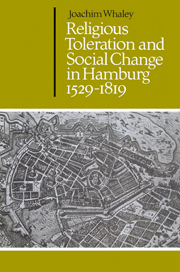Book contents
- Frontmatter
- Contents
- Preface
- Abbreviations
- Illustrations
- Introduction
- 1 The struggle for political stability and purity of belief: Hamburg from Reformation to French Revolution
- 2 The politics of toleration: the Catholic community
- 3 The limits of toleration: Sephardim and Ashkenazim
- 4 The growth of toleration: the Calvinist communities
- 5 Patriotism versus Orthodoxy: the struggle for limited religious freedom, 1760–85
- 6 The image of the city: the search for a tolerant society in early modern Hamburg
- 7 The aftermath
- Bibliography
- Index
5 - Patriotism versus Orthodoxy: the struggle for limited religious freedom, 1760–85
Published online by Cambridge University Press: 18 September 2009
- Frontmatter
- Contents
- Preface
- Abbreviations
- Illustrations
- Introduction
- 1 The struggle for political stability and purity of belief: Hamburg from Reformation to French Revolution
- 2 The politics of toleration: the Catholic community
- 3 The limits of toleration: Sephardim and Ashkenazim
- 4 The growth of toleration: the Calvinist communities
- 5 Patriotism versus Orthodoxy: the struggle for limited religious freedom, 1760–85
- 6 The image of the city: the search for a tolerant society in early modern Hamburg
- 7 The aftermath
- Bibliography
- Index
Summary
On 19 September 1785 the Bürgerschaft assented to a law giving religious freedom to Catholics and Calvinists. The proposal aroused no opposition. The Lutheran clergy were not consulted. Indeed, they only heard of the initiative three days previously. Their hands were bound: they could but wait for official notification of the inevitable. The city abounded with rumours of ‘die Toleranz Bürgerschaft’, and the news of the decision was greeted as a triumph of Aufklärung. At last the intransigence of the citizenry had been overcome; politics prevailed over the pulpit.
Pastor Goeze's comment on hearing the news, that ‘the public has been sufficiently prepared [for this step] by the newspapers’, provides the clue to the general context in which the reform took place. In the first decades of the century the literature on toleration was relatively small. It consisted largely of translations from English, and the works of men such as Thomasius, Buddeus, Wolff, Pfaff. After 1740, the literature began to grow significantly. The emergence of writers like Johann Michael von Loen marked the prelude to a broad stream of writings on the subject of religious toleration in the 1760s. This flood of books and pamphlets was reported and reviewed in self-consciously enlightened journals (Nicolai's Allgemeine Deutsche Bibliothek is the most prominent example) and also in newspapers all over Germany.
- Type
- Chapter
- Information
- Religious Toleration and Social Change in Hamburg, 1529–1819 , pp. 145 - 168Publisher: Cambridge University PressPrint publication year: 1985



